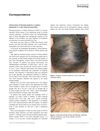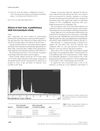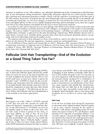 8 citations,
August 2015 in “Journal of dermatological science”
8 citations,
August 2015 in “Journal of dermatological science” Rhododendrol in skin-whitening products can cause skin depigmentation and immune reactions.
26 citations,
February 2022 in “Journal of pineal research” Melatonin affects skin and hair color and protects skin cells, with potential benefits for hair growth and skin health.
8 citations,
January 2013 in “International journal of trichology” Two people had unusual ring-shaped hair loss due to an autoimmune disorder.
 May 2024 in “Dermatologic therapy”
May 2024 in “Dermatologic therapy” AKN is a chronic scalp condition in African-descended males, treated with topicals, antibiotics, steroids, and sometimes surgery or laser.
January 2018 in “Journal of Investigative Dermatology” Blocking certain pathways with kinase inhibitors may help treat cutaneous lupus erythematosus.
 April 2024 in “Skin appendage disorders”
April 2024 in “Skin appendage disorders” Environmental pollutants can damage hair health and cause hair loss.
15 citations,
January 2015 in “Skin Appendage Disorders” Increased scalp sweating in frontal fibrosing alopecia may be linked to local skin inflammation.
 2 citations,
August 2019 in “Journal of skin and stem cell”
2 citations,
August 2019 in “Journal of skin and stem cell” The study concludes that regulating apoptosis could lead to new treatments for various skin and hair conditions.
 77 citations,
March 2001 in “Clinics in Dermatology”
77 citations,
March 2001 in “Clinics in Dermatology” Androgenetic alopecia involves genetics, hormones, and can be treated with medications or surgery.
45 citations,
April 2001 in “The journal of investigative dermatology/Journal of investigative dermatology” Different Myc family proteins are located in various parts of the hair follicle and may affect stem cell behavior.
 23 citations,
January 2021 in “Scientific Reports”
23 citations,
January 2021 in “Scientific Reports” Adding human blood vessel cells to hair follicle germs may improve hair growth and quality.
 102 citations,
April 2014 in “International Journal of Dermatology”
102 citations,
April 2014 in “International Journal of Dermatology” The treatment helped reduce symptoms and stabilize the hairline in most patients with Frontal Fibrosing Alopecia, but hair regrowth was limited.
 7 citations,
September 2015 in “Actas Dermo-Sifiliográficas”
7 citations,
September 2015 in “Actas Dermo-Sifiliográficas” Hair transplantation for Frontal Fibrosing Alopecia may work if done after the disease is inactive for 2 years and with ongoing treatment after surgery.
 160 citations,
March 2009 in “Seminars in Cutaneous Medicine and Surgery”
160 citations,
March 2009 in “Seminars in Cutaneous Medicine and Surgery” New insights show Lichen Planopilaris is a rare, scarring hair loss condition, hard to treat, mainly affecting middle-aged women, and significantly impacts mental health.
 October 2021 in “The Egyptian Journal of Hospital Medicine ”
October 2021 in “The Egyptian Journal of Hospital Medicine ” Combination therapies work better than single treatments for atrophic acne scars.
 October 2024 in “Dermatologic Surgery”
October 2024 in “Dermatologic Surgery” PRP and PRF show promise for hair growth but need more research for consistent and safe use.
 April 2024 in “Clinical, cosmetic and investigational dermatology”
April 2024 in “Clinical, cosmetic and investigational dermatology” Salvianolic Acid B helps hair grow by reducing cell stress and increasing blood flow to hair follicles.
 89 citations,
February 2002 in “Australasian journal of dermatology”
89 citations,
February 2002 in “Australasian journal of dermatology” A premenopausal woman had hair loss and skin issues, treated with topical steroids.
 12 citations,
December 2021 in “Aging”
12 citations,
December 2021 in “Aging” A new painless method to collect hair follicles helps study DNA damage and aging.
February 2023 in “Clinical, Cosmetic and Investigational Dermatology” Higher leptin and lower vitamin D levels may contribute to male pattern baldness.
 13 citations,
January 2018 in “International Journal of Dermatology”
13 citations,
January 2018 in “International Journal of Dermatology” The study found that treatment improved hair condition in patients with Fibrosing Alopecia in a Pattern Distribution in Chile.
 25 citations,
November 2014 in “Ageing Research Reviews”
25 citations,
November 2014 in “Ageing Research Reviews” Skin aging is caused by stem cell damage and can potentially be delayed with treatments like antioxidants and stem cell therapy.
 4 citations,
February 2007 in “Journal of the European Academy of Dermatology and Venereology”
4 citations,
February 2007 in “Journal of the European Academy of Dermatology and Venereology” The study suggests silicon might be important for healthy hair, as less silicon was found in people with hair loss.
 131 citations,
August 2000 in “International Journal of Dermatology”
131 citations,
August 2000 in “International Journal of Dermatology” Inflammation may be linked to hair loss, and targeting specific enzymes could help treat it.
 21 citations,
May 2022 in “Frontiers in Cell and Developmental Biology”
21 citations,
May 2022 in “Frontiers in Cell and Developmental Biology” Hair growth and health are influenced by factors like age, environment, and nutrition, and are controlled by various molecular pathways. Red light can promote hair growth, and understanding these processes can help treat hair-related diseases.
467 citations,
May 1999 in “Molecular Cell” Activating c-Myc in skin causes rapid cell growth and changes, but these effects are reversible.
 6 citations,
January 2019 in “Journal of dermatology”
6 citations,
January 2019 in “Journal of dermatology” Immune checkpoint inhibitors used in cancer therapy can cause hair loss, and understanding this can help manage the side effect.
 October 2023 in “Bioactive Materials”
October 2023 in “Bioactive Materials” The new hair loss treatment combining nitric oxide and minoxidil in a special carrier is effective for hair regrowth.
 44 citations,
November 2011 in “The Journal of Dermatology”
44 citations,
November 2011 in “The Journal of Dermatology” New understanding of the causes of primary cicatricial alopecia has led to better diagnosis and potential new treatments.
 3 citations,
February 2000 in “Dermatologic Surgery”
3 citations,
February 2000 in “Dermatologic Surgery” The document concludes that hair restoration has improved with follicular unit transplantation, making it more scientific and precise.























